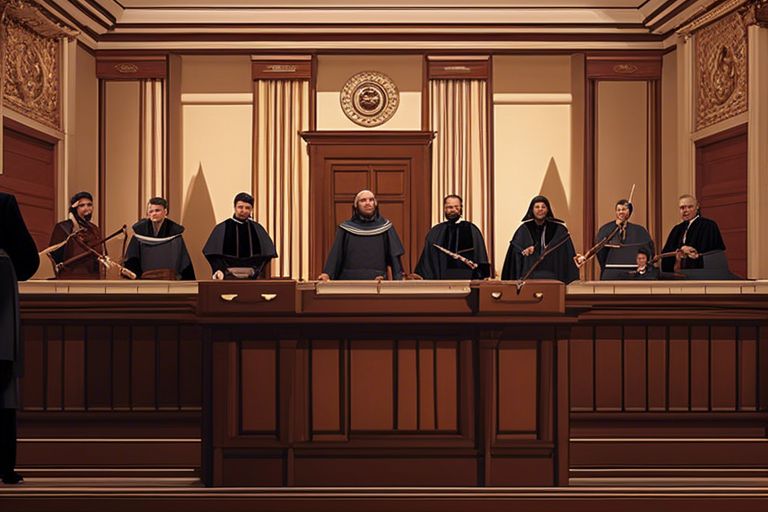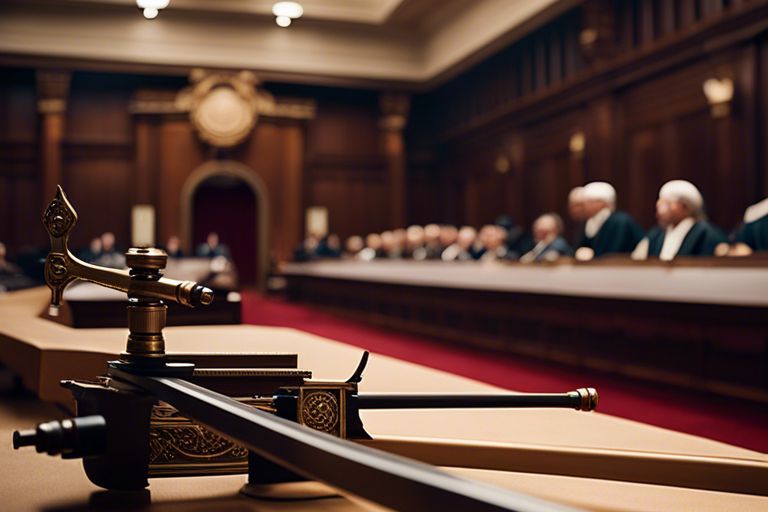With crossbows being powerful and deadly weapons even in ancient times, it comes as no surprise that many civilizations had strict legal restrictions in place to control their use. Understanding the weapon laws surrounding crossbows in ancient societies gives us valuable insight into the importance of regulating such dangerous arms. By delving into the legal restrictions on crossbows, we can uncover how these ancient civilizations sought to maintain order and safeguard their populations from potential harm. Let’s explore the intriguing history and significance of crossbow regulations in the ancient world.

Contents
- Legal Status Of Crossbows In Ancient Times
- China: The Cradle of the Crossbow
- European Restrictions and Codes
- Crossbows As A Military Advantage
- Regulations to Preserve Strategic Superiority
- Limitations on the Usage by Civilians and Soldiers
- Enforcement and Punishment For Illegal Use
- Methods of Enforcement in Ancient Societies
- Examples of Punishments and Consequences
- The Evolution Of Weapon Laws
- Influence of Crossbow Laws on Modern Legislation
- Transition From Ancient Regulations to Contemporary Understanding
- Summing up
Legal Status Of Crossbows In Ancient Times
China: The Cradle of the Crossbow
Ancient China is often regarded as the birthplace of the crossbow, with historical records dating back to as early as the 5th century BCE. The crossbow held a significant military role in ancient Chinese warfare, offering a powerful long-range weapon that was relatively easy to use compared to traditional bows. The crossbow was a formidable weapon that revolutionized warfare, providing soldiers with a deadly advantage on the battlefield.
European Restrictions and Codes
Ancient Europe had a complex relationship with crossbows. While they were valued for their effectiveness in combat, concerns over their power and ease of use led to various restrictions and regulations. In medieval England, for example, laws prohibited the commoners from owning crossbows without royal permission, as they were considered a threat to the reigning authority. The European restrictions and codes aimed to control the distribution and usage of crossbows to maintain social order and prevent uprisings.
China’s early adoption of the crossbow as a military weapon influenced its spread to other civilizations, including Europe, where it became a prominent feature in warfare tactics.
Crossbows As A Military Advantage
Regulations to Preserve Strategic Superiority
SuperiorityNow, when it comes to crossbows in ancient civilizations, regulations were often put in place to preserve the strategic superiority of the military. Leaders understood the power and efficiency of crossbows on the battlefield and sought to control their distribution and usage to maintain an edge over their enemies. By regulating who had access to these advanced weapons, rulers could ensure that their military forces had the upper hand in conflicts.
Limitations on the Usage by Civilians and Soldiers
With the widespread recognition of the crossbow’s effectiveness in warfare, limitations on its usage by civilians and soldiers were common. Preserve These restrictions were imposed to prevent unauthorized individuals from possessing a weapon that could easily penetrate armor and cause significant damage. Civilians were often prohibited from owning crossbows to maintain order within society, while soldiers were given specific guidelines on when and how to use these powerful weapons on the battlefield.
Enforcement and Punishment For Illegal Use
Methods of Enforcement in Ancient Societies
Not all ancient civilizations had formalized legal systems to enforce restrictions on crossbows. In some societies, these laws were upheld through oral tradition and community norms. Those caught violating the restrictions could face social ostracization or retaliation from the community, keeping the use of crossbows in check.
Examples of Punishments and Consequences
With the advancement of legal systems in civilizations like ancient Rome and China, specific punishments were designated for illegal use of crossbows. Offenders could face heavy fines, imprisonment, or even physical punishment such as amputation for wielding a crossbow unlawfully. These severe consequences were meant to deter individuals from disregarding the laws regarding crossbow usage.
Punishment: In Rome, unauthorized use of crossbows was punishable by death, showcasing the seriousness with which the authorities viewed this offence. This served as a clear deterrent to potential violators, ensuring that the laws surrounding crossbow usage were strictly adhered to.

The Evolution Of Weapon Laws
After Why were crossbows banned in the Middle Ages?, it is important to investigate into the evolution of weapon laws in ancient civilizations. Understanding the legal restrictions on crossbows provides valuable insights into the development of weapon laws over time.
Influence of Crossbow Laws on Modern Legislation
Laws governing crossbows in ancient civilizations have had a significant influence on modern legislation. The restrictions imposed on crossbows in the past have shaped contemporary understanding of weapon regulations, highlighting the importance of balancing individual liberty with public safety in crafting laws related to weaponry.
Transition From Ancient Regulations to Contemporary Understanding
An examination of the transition from ancient regulations to contemporary understanding reveals a complex interplay between historical contexts and present-day concerns. The evolution of weapon laws reflects society’s changing attitudes towards violence, self-defense, and governmental control over arms. As civilizations progressed, so did the laws governing the use and possession of weapons.
The shift from ancient regulations to contemporary understanding signifies a move towards more nuanced and comprehensive approaches to weapon laws. Today, lawmakers consider factors such as technological advancements, societal norms, and international treaties when formulating regulations on firearms and other weapons. This evolution underscores the need for a balanced and well-informed approach to weapon legislation in the modern world.
Summing up
As a reminder, crossbows were subject to various legal restrictions in ancient civilizations for reasons related to military control, social order, and the balance of power. The laws governing the possession and use of crossbows were designed to prevent unauthorized individuals from having access to powerful weapons that could potentially disrupt the established order. Understanding these historical restrictions provides valuable insights into how past societies regulated the use of advanced weaponry and underscores the importance of responsible weapon laws in maintaining a safe and orderly society.

Leave a Reply